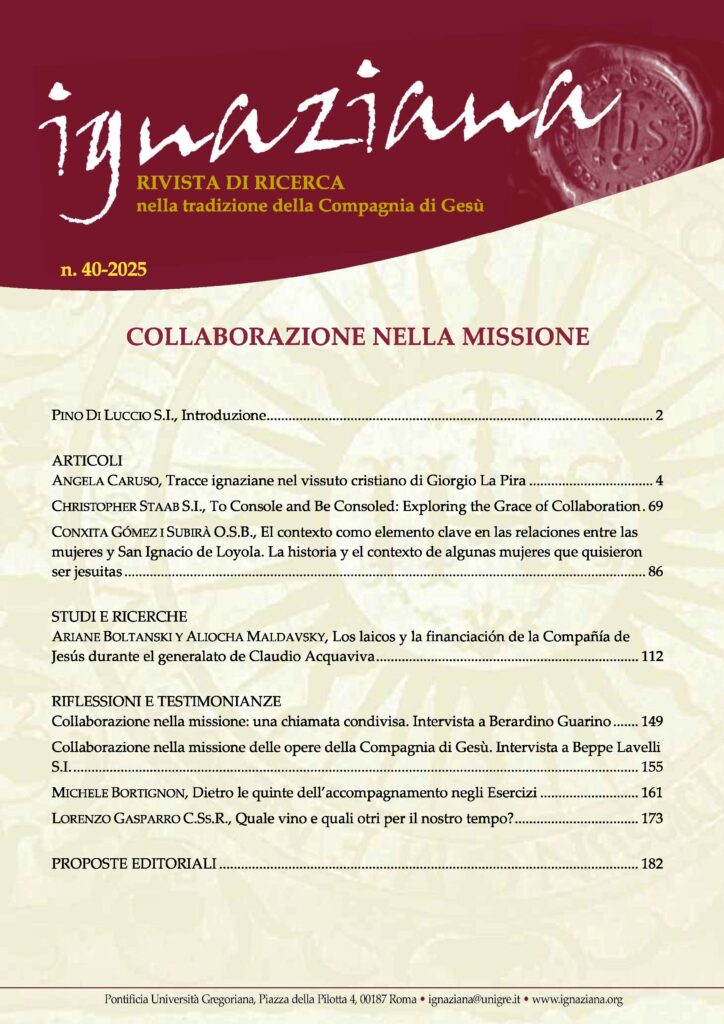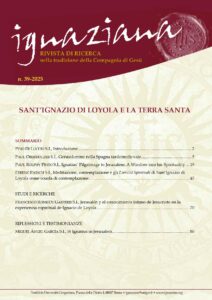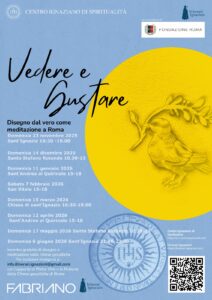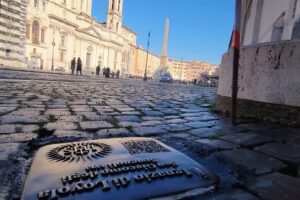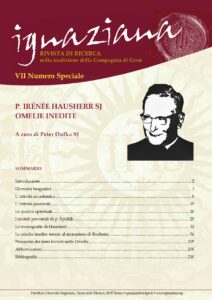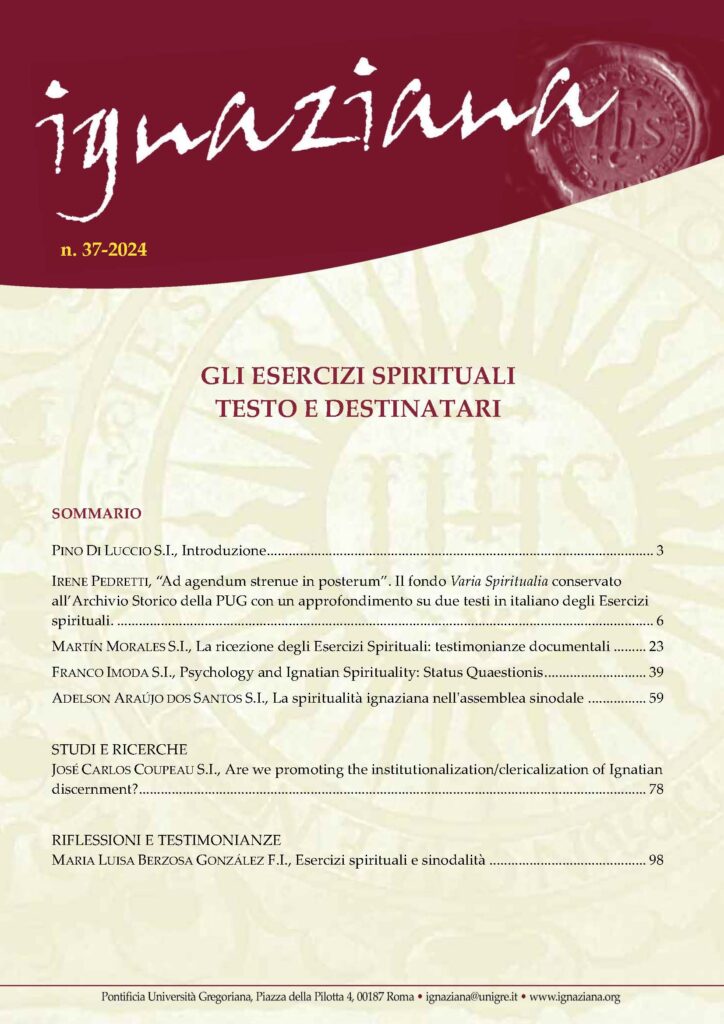
PINO DI LUCCIO S.I., Introduzione
This article by Irene Pedretti analyzes the Varia Spiritualia collection preserved at the Historical Archive of the Pontifical Gregorian University (APUG), with a focus on two Italian texts from the Spiritual Exercises of Saint Ignatius of Loyola. The author highlights how the Exercises exhibit numerous textual variants that do not correspond to the Vulgate tradition or the earliest Italian manuscripts or printed versions. In parallel, the texts of the Resurrection of Lazarus are presented in three different versions. Pedretti observes that the fluidity of the Exercises’ text and the accompanying texts is a distinctive feature, allowing for changes, errors, and interpretations due to the diverse nature of the manuscripts. Despite the belief that print serves to establish a correct text, the author points out cases of stylistic contamination between manuscript and edition. The article concludes with reflections on work in historical archives, emphasizing the importance of training and dissemination activities. The collaboration of students and researchers with APUG is also mentioned, particularly in critical edition projects of texts available on the GATE platform.
MARTÍN MORALES S.I., La ricezione degli Esercizi Spirituali: testimonianze documentali
The text analyzes the practice of the Spiritual Exercises of Saint Ignatius from a historical perspective, considering it as a process of communication and appropriation of a text. The author emphasizes the importance of studying the reception of the text by its original recipients, as communication occurs only at the moment of understanding. The text is always relative to a certain society, and its expectations are oriented not to frustrate those of the readers. The enormous production of handwritten and printed texts on the Exercises has led to a proliferation of variations, necessitating new selections to establish what is considered identitary. The figure of the director of the Exercises served as a way to control the uncertainty of text interpretation and redirect any disappointments in the expectations of the exercitant. The author acknowledges the elusive nature of the concept of “spirituality,” which is essentially historical and refers to the social system in which it circulates. Finally, the author highlights the historian’s difficulties in dealing with the vast amount of unselected but accumulated data, making it impossible to causally connect networks of events into a coherent narrative.
FRANCO IMODA S.I., Psychology and Ignatian Spirituality: Status Quaestionis
This article explores the relationship between psychology and Ignatian spirituality, emphasizing the importance of developing an adequate anthropology that integrates the contributions of both fields. The author highlights how St. Ignatius’ Spiritual Exercises require an approach that takes into account the concrete subjectivity of the person, considering their dynamic and developmental dimension. Six conditions for an adequate anthropology are presented:
- A concrete and historical conception of the person, which includes both the inductive and deductive approach.
- A dynamic conception of the person, which considers their capacity for choice and self-transcendence.
- An openness to the mystery and fundamental antinomy of the human being, between sublime vocation and fragility.
- A teleology and motivation compatible with a religious or Christian anthropology.
- Attention to the development and characteristic defenses of each person.
- An authentic vision of human freedom, which overcomes determinism and illusions.
The author emphasizes how psychology can contribute to bringing hidden wounds to the surface to open them to healing grace, and to orienting decisions towards self-transcendence. Ricoeur’s thought on the symbolic and teleological role of dreams is cited. The importance of dialogue and synthesis between spiritual theology and psychology for an adequate approach to the Spiritual Exercises is also highlighted.
ADELSON ARAÚJO DOS SANTOS S.I., La spiritualità ignaziana nell’assemblea sinodale
The article explores how Ignatian spirituality, particularly the method of “conversation in the Spirit,” is relevant to the synodal path of the Church. The author emphasizes the importance of communal discernment to understand the “signs of the times” and to make prudent pastoral decisions. Some key features of the “conversation in the Spirit” are highlighted:
- It allows for authentic listening and discernment of what the Spirit is saying to the Churches.
- It generates a shared, vital world through the harmonious intertwining of thought and feeling.
- It leads to conversion, experiencing sharing in the light of faith and seeking God’s will.
The author underscores the missionary, ecclesiological, and pneumatological value of this method, which helps transition from the “I” to the “we” and unify the person in a living integration of human and divine elements. Finally, the main moments of the “conversation in the Spirit” used in the various phases of the synodal journey are outlined: personal prayer, initial sharing, prayerful silence, second sharing, synthesis, and final prayer.
STUDI E RICERCHE
JOSÉ CARLOS COUPEAU S.I., Are we promoting the institutionalization/clericalization of Ignatian discernment?
The document analyzes the relevance of spiritual discernment, particularly Ignatian discernment, in the contemporary context. The investigation begins by demonstrating that the term “discernment” has become common in various fields, including art and academic research. The research focuses on spiritual discernment and a possible specification of it, Ignatian discernment. Using F. Campagne’s theory, the meticulous analysis of academic publications and the pontifical exhortations of Pope Francis show that Ignatian discernment has not been influenced by the critical policies of the Society of Jesus. The investigation concludes that Ignatian discernment has had a significant impact on the Church and on the current factors that favor discernment.
RIFLESSIONI E TESTIMONIANZE
MARIA LUISA BERZOSA GONZÁLEZ F.I., Esercizi spirituali e sinodalità
Maria Luisa Berzosa González reflects on Ignatian spirituality within the Synodal Assembly. Ignatian spirituality, which is based on incarnation and listening to the heart, was also present in the synodal assembly. The facilitator coordinated a group that prepared materials for spiritual exercises and participated in the Spirituality Commission and the Communication Commission. Ignatian spirituality was characterized by the freedom of expression and deep listening among the group members. The conclusion highlights the importance of listening to the Lord and being mindful of the risks of formalism, intellectualism, and immobility, hoping for a new synodal assembly that will be an opportunity to listen to God’s will in the current historical moment.
